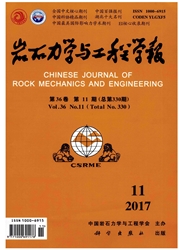

 中文摘要:
中文摘要:
采用MTS815.02S型电液伺服岩石力学实验系统,研究水岩相互作用条件下,煤系泥岩典型应力阶段岩体渗透性变化与遇水后强度弱化规律,并用原位窥视仪实验验证主要结论。研究表明:峰值强度前不同应力阶段遇水弱化程度差异不大,遇水后峰值强度平均降低了14.5%;残余强度阶段遇水对岩块稳定残余强度的弱化最高,达到50%左右,其次是塑性阶段与弹性阶段,在应变软化阶段由于泥质岩体渗流通道的自封闭作用,该阶段遇水对残余强度弱化程度最小:在破坏前的弹性变形乃至屈服阶段,渗透性较弱且随变形增加变化不明显;受载至应变软化阶段,渗透性增强并在残余强度阶段达到渗透峰值,在塑性压密变形阶段没有明显的降低,随变形扩展而逐步趋于稳定。
 英文摘要:
英文摘要:
In consideration of water-rock interaction, strength weakening and permeability of the mudstone under different typical stress stages are studied by MTS815.02S servo-controlled rock mechanical test system. Main conclusions are verified by in-situ test using electrical camera. It shows that water-weakened action of specimen is not notable before the peak strength, and the peak strength decreases by 14.5% after affected by water; the water-weakened action is the highest in residual strength stage, steady peak strength decreases about 50%; water-weakened action in plastic stage and elastic stage are in the second place because of self-sealing action of fissures by water argillization action, and the water-weakened action is minimum in the strain softening stage.With the increasing of deformation, permeability variation of specimen is not notable and maintains lower value in the elastic and yield stage. Permeability coefficient begins to increase in the later strain-softening stage and reaches to the peak value in the residual strength stage, and then tends to steady in the plastic compaction stage.
 同期刊论文项目
同期刊论文项目
 同项目期刊论文
同项目期刊论文
 期刊信息
期刊信息
